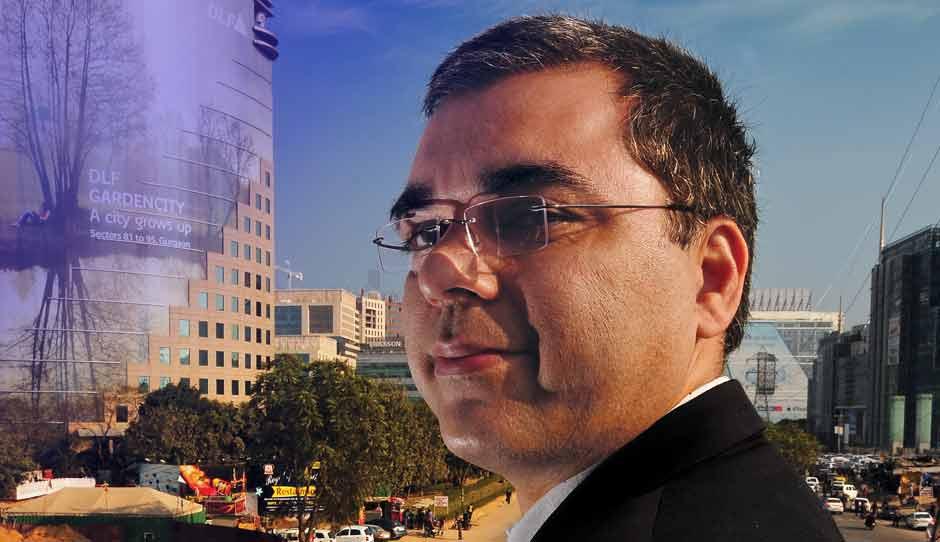Vinay Shukla, EduVisors and Setu Ventures shares his work strategies
- BY Shreyasi Singh
 In Strategy
In Strategy 15384
15384 0
0

It wouldn’t be unflattering to call Vijay Shukla irrationally optimistic. With an engineering degree from IIT BHU, an MBA from XLRI, and stints with SAIL, SmithKline Beecham and Ernst & Young—Shukla could have led a successful corporate career. In his jobs though, he found himself being force fed systems he didn't agree with. But he wasn't the sort to feel down-and-out. So, in 2000, he partnered with his college room-mate and found an angel investor to go the tech start-up way. The venture bombed. Shukla wasn’t scarred for long, if at all. He founded another mobile apps company which shut down during the business turbulence that followed 9/11. He finally “made it” with his third venture, ValueFirst, a mobile messaging and business communications company, that he co-founded in 2003. Today, ValueFirst does annual business of more than `100 crore and has served over 3,000 corporate clients. This wasn’t enough to keep Shukla interested though. In 2009, he left ValueFirst to start anew; an early stage venture capital firm, Setu Ventures, and a niche education consulting firm EduVisors with yet another college mate. For him, business is all about the joy of starting up.
I’m an early morning person. I wake up between 5.30 and 6am. Earlier this was because I travelled a lot and took morning flights. So, getting up early was a necessity. Now, I travel much less but the habit of early mornings has stuck on. Getting up early ensures that I have quite a productive morning. First, I help my children get ready for school. Then, I check all my e-mails. So, by the time I’m ready to leave for work, which is around 9.45am, I have caught up on my backlog. In fact, my most productive days are those where all my homework—preparation for meetings and presentations—are done by 9.30 or 10am. If I can plan my day efficiently in the morning, I can have an execution-oriented work day.
Between home and work, exercise does get de-prioritised. I haven’t managed to get a routine going on that—sometimes I walk, other times I go to the gym.There’s definitely a plan to do more, but at this point it’s not a very well-defined, or well-executed one.
Once in office, I’m extremely focused. I don’t even check my e-mails more than once in an hour, or even once in two hours. It’s not that I’m not into technology. I’m completely wired all the time. In fact, from 1998 till 2012, there have been only two occasions where I have not been connected to the world through internet or the phone for more than three days. The first instance was when I was on my honeymoon. The second time was on a holiday when my phone conked off and I was not carrying a laptop.
But, when I'm really working and in office, my phone is more likely than not on silent. In fact, I’m much better on e-mail while I’m travelling. I respond immediately on the BlackBerry. More and more, I’ve noticed that people think checking e-mails is work. It’s not. Being online all day can be a huge distraction. Some people do it on the pretence of social networking. I don’t believe in that. Social networking doesn't help at all, and to do it during office time is unprofessional. At work, Facebook is a negative investment. Left to me, I wouldn't receive too many phone calls. Ideally, I would keep my voice mail activated all the time, and call people back later. I did use the voice mail for many years but in India, many people have a problem with that. Voice mail might be accepted well internationally but here people think you are “acting pricey”.
Work is worship—discipline and regiment are a big chunk of doing a good job. A lot of people think that when they turn entrepreneurs or become their own bosses, they can work around their own time. But a nine-to-six routine is a key ingredient to being successful, especially when you’re on your own. When you work, you should just work. I’d never allow myself to get out in the middle of a day, and meet a friend over lunch or a drink. Lunch, for me, is quick at the work table, or even if I’m meeting somebody, then it’s a working lunch. Those sometimes do get stretched.
I’ve to confess that I have a tendency to spend more than desirable time in meetings. This happens often. It’s one of my productivity breakers. I can see why I lose some days because of this.
What I really enjoy is the joy of creation—the first few years of setting up a company, and seeing it stand on its feet. There aren’t too many interruptions. And, you don’t have to deal with large teams or structure. I have to confess I don’t enjoy managing large teams, or people in general. As an entrepreneur, I’ve been lucky that I don’t need to do that, unlike in a large corporate, where you have to. When you work for yourself, you can create your own ecosystem. Of course, the key is to understand one’s own references, and be aware of your strengths and weaknesses. In all my ventures, I have been very clear that somebody else needs to take care of the operations part. I always focused on business development. Even in Eduvisors, my co-founder takes care of the team. I focus on bringing the business in. Managing a team on a day-to-day basis is something I’m not comfortable with. I look at it as more of an interruption when people come to me with their problems. Because I don’t enjoy it, I’m very poor at it. Or maybe because I’m poor at it, I don’t enjoy it. I’m not sure which is more true—but I would rather not bother about it.
You have to arrive at a structure where you can give your best. I still remember what a top boss at Smithkline Beecham, the company I joined right after my MBA from XLRI, had told all the recruits during induction. He said that if you don’t feel like going to office for three days in a row, you should quit. In fact, a part of the reason for which I decided to quit ValueFirst as it was scaling-up, was because it was becoming a bit too structured and big. I’m not a scale guy. That’s not my measure of success. People find it strange but I don’t adhere to the think-big credo. In fact, I find this rush to make it big in quick time extremely annoying. Also, a lot of people now have this super obsession with scale. It’s not something I subscribe to. How many people have been able to build even a 20-people company? Even that is commendable, and very tough to do. But people are too hung up on scale and success.
Now, I run two outfits; Setu Ventures and Eduvisors. I don’t find balancing both difficult. It’s part of what I call “wide spectrum frequency modulation”. It’s important for every entrepreneur to change hats and frequency depending on the person he or she is interacting with. At one level, you could be negotiating a million-dollar deal, and an hour later, you could worry about how your office is spending even a thousand rupees.
Plus, I’ve finally arrived at the right model of investing. Setu Ventures has invested in 12 companies so far. Earlier, apart from writing a cheque—anything between `5 lakh and `50 lakh—I would spend time with the entrepreneurs. I wanted to do more than just give gyaan. But, I realised that this model of investing just didn’t work. Your time is valuable, but it’s not valued. Today I just sign a cheque. Moreover, I’ve created my networks, so scouting around for promising start-ups doesn’t take up much time either. Fortunately, I don’t have to spend too much time in identifying start-ups today. I’m linked to the IIM Ahmedabad incubation programme, so they do the shortlisting. In fact, over the past few years, my work life has changed. Entrepreneurship is about gears. If you’re in gear one or two, you don’t have any time. You’re on the pedal all the time. When I had just started out on my own, I worked 18 hours a day. Then, the focus was financial success. ValueFirst was certainly built to flip. I wanted to be free of the financial pressure of having to work for a living. That’s happened now. So, my life is in a different gear. I can’t do 18 hour workdays, or dozens of meetings per week. But, while the number of meetings has gone down, the quality has gone up. That is more important. Now, it’s about building a company to last. Exiting a business is a very modern, venture-capital terminology. Who did that earlier?
My entire approach towards work has changed today. Earlier, the drive was financial. Now, I want to be involved in employment creation. That’s where India needs to put in a lot of effort. Through my work, and through the institutions that I partner with, in the next 30 years I want to help create a million jobs. That is what is exciting about Eduvisors. We help set up and manage universities and schools, all of which lead to real, tangible, long-lasting jobs.
When you change the way you work, the way you live on a personal level changes, too. My work-life balance is probably better than it’s ever been before. Not that I believe in playing up one against the other because actually this is a very contextual situation—it mainly flows from financial stability. It’s also a function of a person’s psychological make-up.
When somebody doesn’t have money, there’s no question of wanting a work balance. It’s only after attaining a certain level of material comfort and financial stability that one begins looking at things holistically.
Of course, I miss the time I lost out with my family and the comforts I could have given them in the early years of running my ventures. I neither had time for my wife and my kids nor any money. My wife kept the house running. We had made a pact, almost like a Rahul Dravid and Virendra Sehwag partnership. If one is on a sticky wicket, the other partner should be able to hold the other end. In fact, marrying the right person, in context of entrepreneurship, is crucial. I’ve seen several of my contemporaries miss the entrepreneurial bus because they didn’t get enough support and buy-in from a spouse. Your environment, like I said, has to be according to your situation. Otherwise, you go through hell.
Between work and family, I don’t have time much for anything else. I do read a lot in my free time. Most of my reading is around management and entrepreneurship. In fact, most of the books in my home library are on these two topics. My wife complains that I’ve spent a lot of money on a golf club membership even though I don’t really play. But I got it five years ago, and I figured if I have it, I’ll pick it up sometime. It doesn’t need to be done right away.
Change your frequency to fit the situation or person you are dealing with.”
“Entrepreneurship is about gears. If you’re in gear one or two, you don’t have any time. You’re on the pedal all the time.”
New Horizons His earlier ventures were about netting financial stability. Now, Vijay Shukla wants to create jobs.





























Add new comment